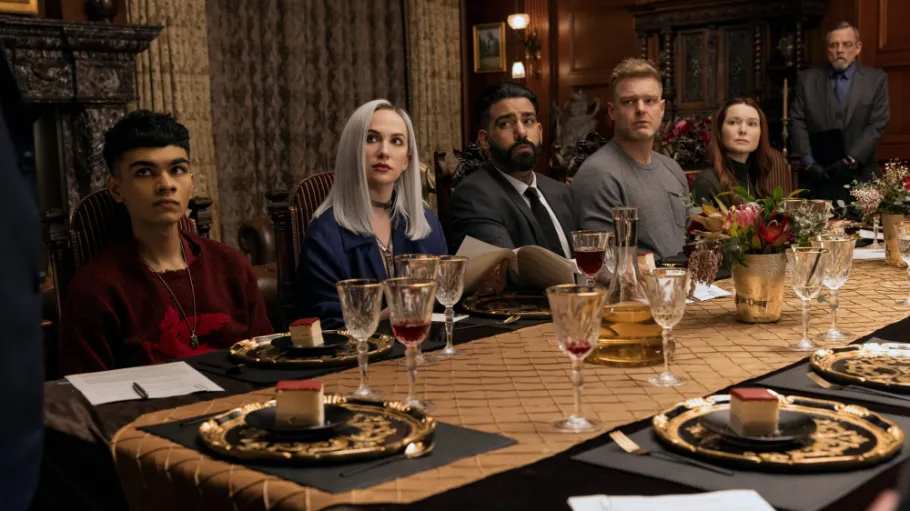Enter the spooky realm of Netflix‘s captivating series “The Fall of the House of Usher,” which skillfully combines the modern shadow of the opioid crisis with the macabre tales of Edgar Allan Poe. The Usher family, led by the mysterious Roderick and Madeline Usher, is the main focus of this drama from 2023. The story takes place against the backdrop of Fortunato, a powerful pharmaceutical company whose fortunes have been tarnished by the addictive painkiller Ligodone. Enthrallingly blending the past and present, secrets, tragedies, and a never-ending quest for justice unfold as we set out on this adventure.
Is Netflix’s “The Fall of the House of Usher” Based on a True Story?
The Fall of the House of Usher Plot
The pharmaceutical empire of the Usher family, Fortunato, provides a backdrop for the story as it develops amidst the maze of the opioid crisis. At the head of this empire, Roderick and Madeline Usher, with Ligodone, a painkiller wrapped in a lie, accumulate unfathomable wealth. Assistant United States Attorney Auguste Dupin sets out to reveal their illicit schemes. Nevertheless, the story takes a grim turn when the Usher heirs meet terrible ends under strange circumstances, which forces Roderick to confess his faults in front of a forlorn audience. As the father struggles with the terrifying CADASIL illness, family secrets come to light.
Did Roderick and Madeline murder each other in The Fall of the House of Usher Finale?
This compelling series comes to a head in the last episode, “The Raven.” The intricate network of Madeline and Roderick’s childhood misdeeds, the nature of their deal with the enigmatic Verna, the terrible deaths of the Usher children, and the outcome of Auguste Dupin’s inquiry into Fortunato’s involvement in the opioid crisis are all revealed in this crucial hour.
The show reaches a climax in the finale that leaves fans on the verge of excitement. The crucial query is this: Did the two main pillars of the Usher family, Roderick, and Madeline, meet their deaths in a gruesome dance of mutual destruction? The answer reveals itself in a terrifying way. A terrifying character named Verna plays a symphony of death, indicating that the siblings must die together. In a poetic turn of events, Madeline, having been mummified by her brother, escapes the grip of death and carries out the prophecy by strangling Roderick. The series’ sad undertones are echoed in the end, which is the pinnacle of poetic justice.
What Causes Madeline and Roderick to Kill Each Other?
The fundamental drives underlying Madeline and Roderick’s tragic decisions are revealed in the heartbreaking conclusion. Their obsession with riches and power drives them to make a Faustian deal with Verna in which all of their desires come true at the expense of the lives of their heirs. Roderick accepts the bargain out of unfettered avarice, setting off a series of unfortunate events that culminate in his children’s untimely deaths. Madeline, on the other hand, decides to break free from the cycle by taking deliberate measures to make sure her crimes are not remembered by her heirs.
The agreement between the Ushers and Verna is a biting social commentary on the moral decline of billionaires who accumulate fortune at the expense of the underprivileged and future generations. The show emphasizes how the acts of the Usher family have an impact on future generations while making connections to contemporary situations.
The Fall of the House of Usher Finale Ending
Verna’s final visit to the Ushers’ graves adds a symbolic sense of closure as the story comes to an unsettling end. Gifts signifying the interests of each family member, the event plays out like a macabre poetic ritual. Shiny tokens that resemble a raven’s collection offer a moving analysis of the vices and lives of the characters.
Following the passing of Madeline and Roderick, Dupin’s lawsuit against the Usher family is unsuccessful, and Fortunato disintegrates after receiving Juno’s inheritance. Gifts from Verna’s visit evoke the spooky beauty of Edgar Allan Poe’s “Spirits of the Dead,” creating a melancholy scene of intertwined and shattered lives.
In summary, “The Fall of the House of Usher” is a terrifying examination of addiction, moral decay, and poetic justice that has echoes of Edgar Allan Poe’s gothic tales. It goes beyond simple storytelling. As the lights go down, the Usher family’s history lives on as a warning of the darkness that can exist while pursuing power and fortune.
Who is the informant in The Fall of the House of Usher?

